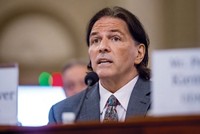Advertisement
Grab your lab coat. Let's get started
Welcome!
Welcome!
Create an account below to get 6 C&EN articles per month, receive newsletters and more - all free.
It seems this is your first time logging in online. Please enter the following information to continue.
As an ACS member you automatically get access to this site. All we need is few more details to create your reading experience.
Not you? Sign in with a different account.
Not you? Sign in with a different account.
ERROR 1
ERROR 1
ERROR 2
ERROR 2
ERROR 2
ERROR 2
ERROR 2
Password and Confirm password must match.
If you have an ACS member number, please enter it here so we can link this account to your membership. (optional)
ERROR 2
ACS values your privacy. By submitting your information, you are gaining access to C&EN and subscribing to our weekly newsletter. We use the information you provide to make your reading experience better, and we will never sell your data to third party members.
Environment
Katrina, climate change
January 2, 2006
| A version of this story appeared in
Volume 84, Issue 1
The tragic catastrophe in New Orleans came as no surprise to scientists concerned about the increased threat of coastal flooding from global warming. This subject was the focus of an international conference on "Climate Change, Extreme Events, and Coastal Cities" held last February at Rice University. Storm intensity is linked to high sea surface temperatures and global warming (Nature 2005, 436, 686). Dangers specific to New Orleans are well-documented in reports from Louisiana State University. On the eve of Katrina's second landfall, hurricane expert Ivor van Heerden of LSU vividly described the likely inundation of New Orleans, and Jeff Masters wrote, "I put the odds of New Orleans getting its levees breached and the city submerged at about 70%" (www.wunderground.com/blog/JeffMasters).
Somehow this information never reached government officials. President Bush said, "I don't think anybody anticipated the breach of the levees." The secretary of homeland security and the director of the Federal Emergency Management Agency were likewise incredulous. Consistent with this outlook, the Bush Administration routinely gave low priority to funding requests for protecting New Orleans.
What can we learn from this debacle? Clearly, scientists should have a more prominent advisory role in government, and executives should listen. Sorry, but it ain't gonna happen anytime soon.
Perhaps the most important lesson is that global warming really is affecting the climate. With normal sea surface temperatures, Katrina would have been smaller and less intense. Because of global warming, natural disasters are becoming a graver threat than terrorist attacks. In order for us to assess the dangers and formulate defense plans, climate modeling should be placed on par with military intelligence gathering.
Modeling is not perfect. As chemists know, molecular modeling with density functional theory involves a hodgepodge of methods that sometimes give bizarre predictions. However, the insights we derive from quantum mechanics lead to a far deeper understanding of chemical reactivity than we ever got from Lewis dot structures. In chemical terms, the current Administration is trying to do cutting-edge science while fumbling around with the Dreiding models they used in school.
Denial of global warming is bad science and bad policy. This mind-set has now contributed to vast destruction and death in a great American city.
Bill Wilson
Houston
Executive Compensation Information Available
Information from the American Chemical Society's 2004 Form 990 is now available to ACS members on chemistry.org. To access the information, please have your ACS membership number handy and follow these instructions: Log on to chemistry.org (you must be registered, a process that takes about a minute), click on the tab "ACS Members" at the top of the page, click on the item under "Member Information and Benefits" that reads "Compensation of ACS Officers and Key Employees," scroll to the bottom of the page, and click on "Request 2004 Compensation Schedules." Fill out your e-mail information, and, within a minute, you will receive an e-mail with an Adobe Acrobat PDF file.



Join the conversation
Contact the reporter
Submit a Letter to the Editor for publication
Engage with us on Twitter